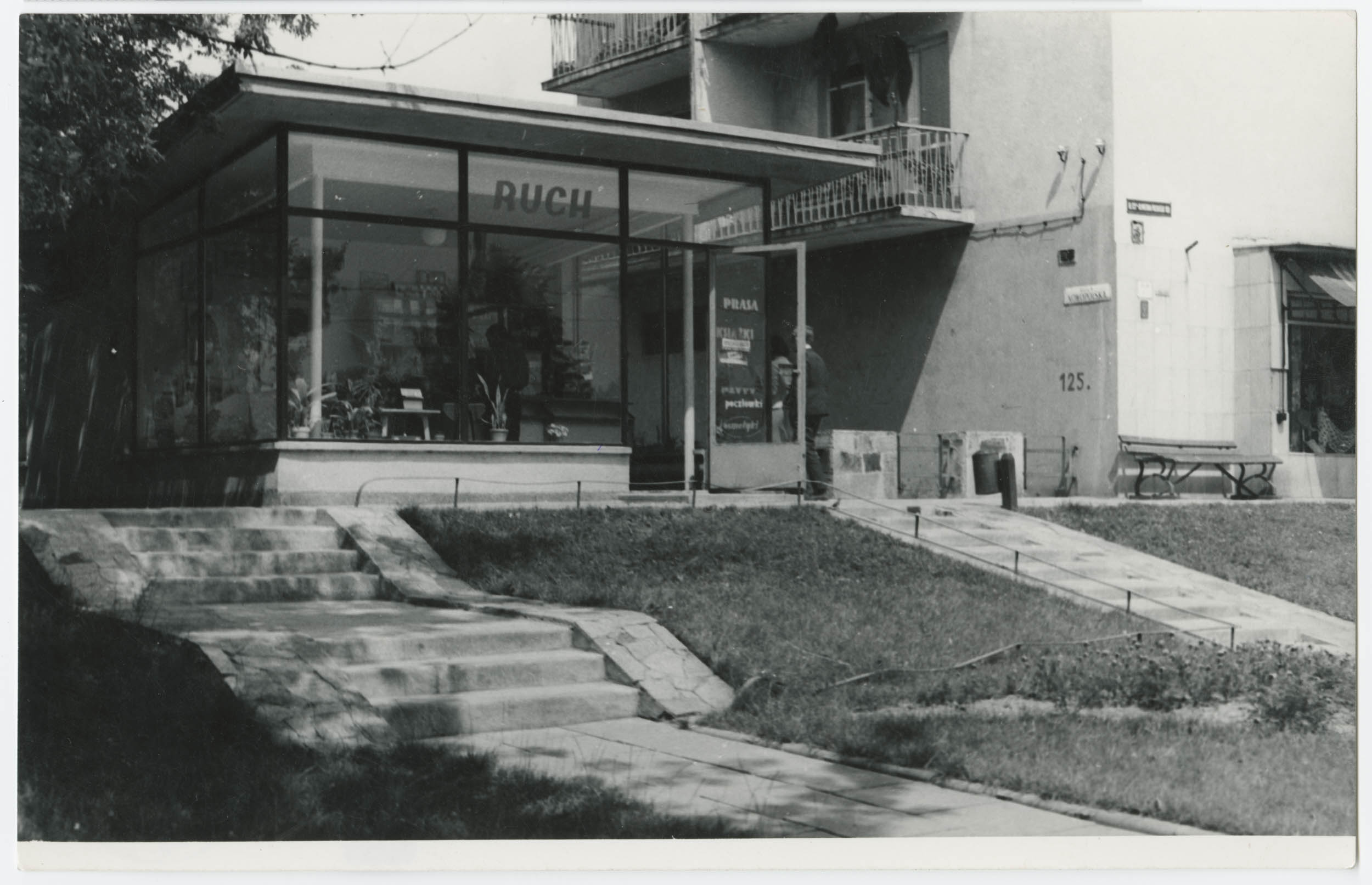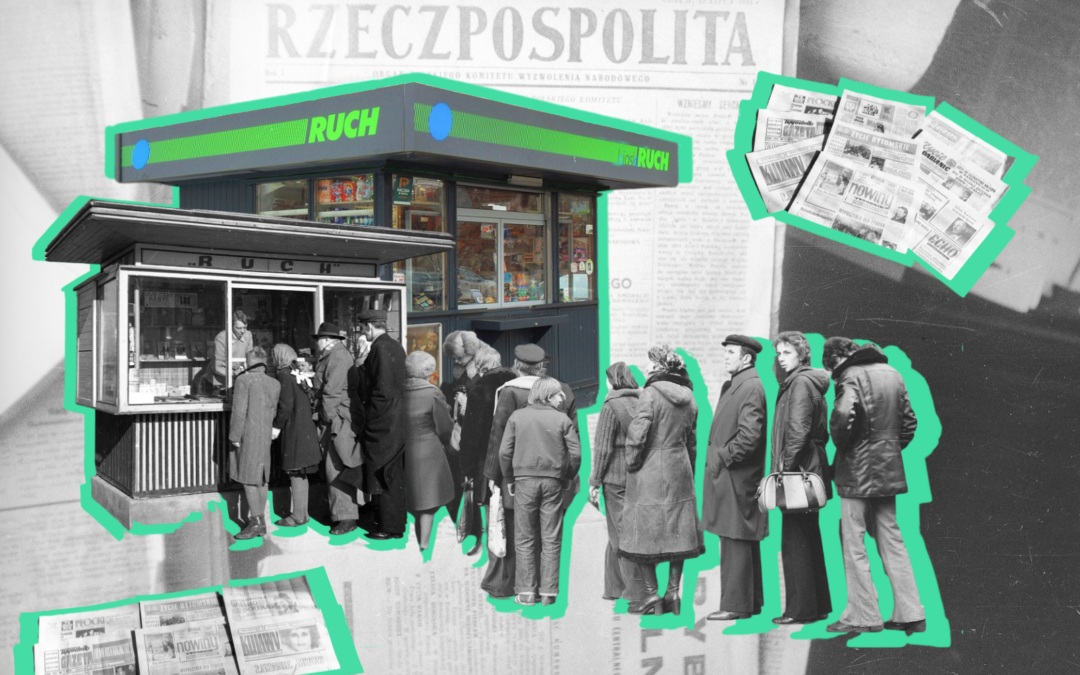Keep our news free from ads and paywalls by making a donation to support our work!

Notes from Poland is run by a small editorial team and is published by an independent, non-profit foundation that is funded through donations from our readers. We cannot do what we do without your support.
By Olivier Sorgho
Poland marked the end of an era in December when its last Ruch kiosk closed down. These small booths, selling newspapers, snacks and other everyday items, had operated for over a century, with over 31,000 branches at their peak. But a failure to modernise ultimately killed them off.
For decades, the green and yellow booths were a common sight on Poland’s streets. Now all of the company’s iconic kiosks have met their demise, with the last one closing on 20 December.
The outlets provided Poles with everyday goods like newspapers and magazines, cosmetics, snacks, cigarettes and public transport tickets. But they were more than just convenience stores.
Dziś zakończył pracę ostatni kiosk Ruch-u. Działały od 1919 roku.
Zostanie jeszcze kilku najgorliwszych ajentów ale spółka nie ma już żadnego.
Pamiętam jak stałam w kolejkach by kupić rodzicom papierosy. Czuję się stara.
Pa. Dowiemy się w końcu gdzie chodzili na siku? 😁 pic.twitter.com/n73fUhZmMw— Asgard 🧠🤌🏻 (@agaj_jaga) December 17, 2024
“They became places for meetings and short conversations, especially in smaller towns, where they were the centre of local life,” says Jarosław Kinal, a sociologist at the University of Rzeszów.
“A client once told me: ‘You’re the second most important person in town after the parish priest,” recalls Anna Chojnacka, who previously ran a Ruch kiosk in Bytom, a city in southern Poland.
Last July, like hundreds of other remaining franchisees, Anna received a termination notice from Ruch. “We knew this day would come,” she says, explaining that her kiosk, despite still seeing demand, often lacked products because Ruch did not pay suppliers on time.
From a peak of more than 31,000 branches in the 1990s, kiosk numbers plummeted to around 1,300 in 2019, with only around ten still operating as of early December 2024.
Kraków's old kiosks are gradually transforming into Bitcoin ATMs pic.twitter.com/dxBEDGXTAy
— Daniel Tilles (@danieltilles1) November 13, 2024
The previous month, Polish state energy giant Orlen, Ruch’s majority owner, announced that its remaining kiosks would be closed down by the end of 2024 because they were not profitable.
A history that began alongside Polish independence
The story of Ruch’s kiosks began in 1918, in the wake of Poland regaining independence, when two booksellers sought to improve readership of literature and press in a reemergent Polish society that was reclaiming its national identity.
Jan Stanisław Gebethner and Jakub Mortkowicz established Ruch on 17 December 1918 and shortly after, in January 1919, opened its first kiosk in Dworzec Wiedeński, Warsaw’s main railway station at that time.
By 1935, their firm had become Poland’s sole nationwide distributor of newspapers, despite being hit by the great recession, which plunged Mortkowicz deep into debt, culminating in his suicide in 1931.

A Ruch kiosk in Łódź in the 1950s or 1960s (image credit: Ignacy Płażewski/Museum of the City of Łódź/Wikimedia Commons)
In 1973, during the communist era, the company was merged into RSW Prasa-Książka-Ruch, a monopoly controlled by the governing Polish United Workers’ Party (PZPR) and a key tool for the regime to exercise press censorship and grow its coffers.
Prior to the merger, the PZPR’s main source of financing were subsidies that it handed to itself from taxes in the state budget. By establishing the biggest media conglomerate in eastern Europe, they were able to finance the party directly from RSW’s substantial profits, which amounted to 163.6 billion zlotys in 1989.
The PZPR owned around 95% of RSW, which published 242 press titles with a combined circulation of 24.3 million copies in 1977, or around 85% of Poland’s total press market.
The company’s logistics network supplied state-controlled newspapers to 34,000 sales points in cities and the countryside, thus holding a monopoly over press distribution. Most of those distribution points were Ruch kiosks, which were also the most popular place for Poles to buy everyday items.
Teraz nawet kiosków ruchu nie ma 😃Czas komuny bezruch,beznadzieja,jedyny kiosk ruch😁 pic.twitter.com/2lC3uE2l1n
— Dymny#SilniRazem (@Dymny6) July 3, 2022
“A kiosk was once a staple in the countryside. You could buy virtually anything there, apart from groceries,” says Adam Smyk, a resident of a small village in the Opole voivodeship.
“During the PRL, kiosks were like the internet today. If you needed information, such as the bus schedule or local gossip, you’d go to the kiosk because everyone gathered there,” he remembers. “When the kiosk closed, we would play cards on the counter.”
A rapidly modernising world
The fall of communism in 1989 led to RSW being dismantled through a government commission, which presided over the sale of most of its press titles and printing facilities to private investors. Some titles, like the weekly Polityka, were handed over to journalists’ cooperatives.
Ruch was spun off into a fully state-controlled company in 1992, after which it retained a strong position in the press distribution market and continued to run tens of thousands of kiosks. But the new economic order also brought competition, notably from press distributor Kolporter and, later, from convenience retail giant Żabka.
Poland’s Żabka, which runs Europe’s largest chain of convenience stores, has announced plans for an initial public offering.
It is expected to be one of the biggest-ever debuts on the Warsaw Stock Exchange, valuing the firm at up to $8 billion https://t.co/jS6G3CHuTz
— Notes from Poland 🇵🇱 (@notesfrompoland) September 24, 2024
In 1997, Kolporter introduced the “press salon” indoor kiosk format, often located in areas with high footfall, like shopping centres and airports. By 2007, it had around 1,000 such outlets, compared to Ruch’s 8,000 kiosks.
Although Ruch had expressed an interest in buying its rival’s press salons in 2009, the latter managed to win from the former some contracts to supply retailers. Kolporter had also already diversified and opened an online store in response to declining newspaper sales.
Those proved to be wise moves for Kolporter – and may have sounded the death knell for its rival. The following year, Kolporter overtook Ruch as Poland’s leading press distributor and continued to maintain its position amid steadily tumbling physical press sales.
In 2023, Poland’s national daily newspapers, when combined, sold around 300,000 copies per issue on an average day, a sharp drop from the roughly 1.4 million copies sold just a decade earlier.
“For a few years now, we have been observing the migration of readers towards the digital press, especially readers of the younger generation,” says Artur Gasiński, deputy head of the Chamber of Press Publishers (IWP).
The internet, as well as the increasing use of smartphones, has also led to increased online sales of public transport tickets, which were in 2010 responsible for roughly a quarter of a typical city kiosk’s revenue.
Warsaw’s public transport authority (ZTM) reported in February that ticket purchases made in 2023 via mobile applications had surged by 43% year-on-year, and made up 35% of total ticket sales.
Public transport authorities have also shifted towards selling tickets from self-service machines at tram and bus stops, or inside the vehicles.
Debt and politics
Alongside failing to modernise and meet the challenges of the 21st century, Ruch was also dogged by questionable financial decisions made in the years before its sale to Orlen.
One such transaction happened in 2011, when the firm purchased around 200 million zlotys worth of bonds from Lurena Investments, a subsidiary of its owner, Eton Park. The bonds were never repaid and in 2018 Ruch wrote off 253.6 million zloty on the deal.
“If Ruch had had this money a few years ago, the company’s situation could have been completely different,” commented Tomasz Jóźwik, the Polish Press Agency’s business editor, in 2018, when the firm was nearing default.
That year, Ruch was forced to restructure under court supervision amid growing debts. It also faced allegations of fraud from Poland’s Central Anticorruption Bureau (CBA) in relation to a loan the company obtained from Alior Bank. As part of the restructuring deal, Alior cancelled its debt and bought Ruch for a symbolic 1 zloty.
The bank subsequently sold the company in 2020 to Orlen, who followed up the purchase with the acquisition of Polska Press, a leading regional newspaper owner.
The editor of a newspaper owned by state oil giant Orlen has left his post, the 14th such case since its media takeover
A former aide to President Duda is reportedly becoming deputy editor of another paper, raising further concern over political influencehttps://t.co/UBawb0stVe
— Notes from Poland 🇵🇱 (@notesfrompoland) July 14, 2021
Those deals effectively granted state company Orlen, and through it the ruling Law and Justice (PiS) party, significant influence over Poland’s press publishing and distribution market, moves that were criticised as politically motivated rather than reflecting genuine business opportunities.
Indeed, Ruch’s financial struggles continued. It made a loss of 110 million zloty (€25.73 million) between 2021 and 2023, while its debt surpassed 160 million zloty by the end of that period.
Struggles to compete
Orlen, like Ruch’s former owners, failed to adequately modernise the company and its kiosks. It introduced in 2021 a new kiosk format offering hot dogs and coffee, with plans to have around 900 such outlets within four years.
But such attempts at modernisation were a case of “too little, too late” to compete with rival business Żabka, says Agnieszka Górnicka, the CEO of market research firm Inquiry.
Polish state oil giant Orlen has opened its first stand-alone store, with an aim for hundreds more to follow.
The firm is also seeking to diversify away from fuel by developing delivery services and, more controversially, buying hundreds of media outlets https://t.co/kOPmHaPKYa
— Notes from Poland 🇵🇱 (@notesfrompoland) June 23, 2021
Żabka, now Poland’s leading convenience store chain, operates small franchises that offer basic groceries, fast food, newspapers and magazines, alcohol and cigarettes, snacks and drinks, cosmetics, and parcel services.
Starting with seven stores in 1998, it rapidly grew to around 4,000 locations by 2014 and today operates more than 11,000. Seventeen million Poles live within 500 metres (1,640 feet) of the nearest Żabka.
“Żabka did not carry the baggage of press distribution, but simply developed its convenience stores in a very modern, very well-managed format,” Górnicka explains. “It has an incredibly efficient way of managing store locations, and adjusts their format and product availability to the local clientele”.
Two former Ruch franchisees told Notes from Poland that although their kiosks were well situated near train stations or in residential areas, they had limited flexibility to restock products in response to customer demand.
“We mostly couldn’t order products. The [Ruch] planning department handled this, but wouldn’t ask [franchisees] for feedback. They would often supply us with products that didn’t sell,” says Dominika Biszoff, who together with her husband managed four Ruch branches in Warsaw.
The number of shops in Poland fell by 1,800 last year to an estimated 99,400.
Some 5% of small grocery stores and 11% of kiosks closed, while discount chains and supermarkets flourishedhttps://t.co/uJGxXbKuwN
— Notes from Poland 🇵🇱 (@notesfrompoland) March 5, 2021
But kiosks also faced other competitive pressures. Soaring inflation has contributed to many Polish small businesses losing customers as people living in Poland cut their spending and opt for cheaper alternatives, such as the Biedronka and Lidl supermarkets.
Even if a kiosk and discount supermarket sell an everyday item for a similar price, the latter is likely to take business from the former “since people already go to Biedronka or Lidl to buy groceries”, says Górnicka.
“Once prices reached sky-high levels [owing to inflation], customers stopped buying some of our high-margin products like sweets, drinks, and cleaning products,” adds Biszoff.
Independent kiosks
The lack of kiosks will be felt by certain demographic groups, says Kinal, the sociologist. “The loss of such places will particularly affect older people,” who might feel alienated by supermarkets’ use of new technologies, such as mobile apps and self-service checkouts.
While there are now no kiosks operating under the Ruch banner, around 60 franchisees have decided to buy their branches from the firm and run them independently, the company’s press office reports. Biszoff is also planning to do that with one of her kiosks in Warsaw’s Ursus suburb.
“There is still demand,” she claims. “In our neighbourhood, people are lamenting that there are no more kiosks.” The local authorities, who formerly rented out the land to Ruch, have just given her the green light to operate an independent kiosk.
Chojnacka, the former Ruch franchisee from Bytom who now runs her own newsagent 20 metres away from where her kiosk once stood, says that around 70% of her clients are elderly people who still read newspapers.
But she has other types of visitors, including migrants from Ukraine and Georgia, who come to buy mobile phone SIM cards and top-ups, she adds.
Georgian bakeries have become a common sight in Polish cities amid a boom in immigration from the Caucasian state.
Poland's growing economy has made it an attractive choice, while Georgians also say it feels culturally closer than Western countries https://t.co/hebNClOto3
— Notes from Poland 🇵🇱 (@notesfrompoland) November 20, 2024
Marek, who has owned a private kiosk in Wrocław since 1997, and prefers not to share his full name, says his connection with the local community is keeping his business going for now. “The big supermarkets are too chaotic for them, so they come to me.”
He admits, however, that “this business is dying,” explaining that Biedronka and Lidl are luring some of his customers away due to their lower prices.
The future of Ruch is now unclear, with its press office reporting that Orlen might repurpose it as part of its parcel delivery network. What is certain, however, is that its once iconic booths will no longer line Poland’s streets, having been consigned to history as relics of outdated economic times.

Notes from Poland is run by a small editorial team and published by an independent, non-profit foundation that is funded through donations from our readers. We cannot do what we do without your support.
Main image credit: Artur Andrzej/Wikimedia Commons (under CC BY 1.0) and Narodowe Archiwum Cyfrowe. Collage created by Agata Pyka




















